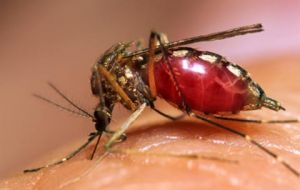MercoPress. South Atlantic News Agency
Dengue “yellow alert” in north-east Argentina next to Paraguay
 Paraguayan sanitary authorities confirmed over the weekend 62 cases of dengue
Paraguayan sanitary authorities confirmed over the weekend 62 cases of dengue Argentine sanitary officials from the north-eastern province of Misiones declared a “yellow alert” following reports of several cases of the mosquito transmitted dengue disease in several locations of neighbouring Paraguay.
Jose Guccione, Misiones Minister of Public Health said the measure was “preventive” and triggered by an outbreak of the disease in the village of Presidente Franco, close to the so called triple border, where Argentina, Paraguay and Brazil meet.
Guccione said that in the small village at least three cases have been reported and involve people who never left the location so they can be described as “autochthonous”. Presidente Franco is only miles away from Puerto Iguazú in Argentina.
Deputy Minister of Public health Oscar Herrera said that his office would be releasing a daily report on the Misiones province epidemiologic situation as well as recommending preventive measures to counter any chances of the disease advancing.
The state of yellow alert was decided after Argentine Health Minister Juan Luis Manzur and sanitary officials from all provinces met in Puerto Iguazú to decide on a package of preventive measures with their counterparts from Paraguay and Brazil.
Paraguayan sanitary authorities confirmed over the weekend 62 cases of dengue and announced a massive prevention campaign.
The disease which is transmitted by the Aeded Aegypti mosquito ravaged the region last summer with thousands of cases in Paraguay, southern Brazil, Argentina and even further north in Bolivia.
Reliable statistics are hard to obtain but the Pan-American Health Organization estimates that deaths in the four countries tropical region in the heartland of South America could have been over a hundred.
Argentina admits that last summer particularly in the provinces of Chaco, Salta and Catamarca the number of reported cases was 17.856 of which four deaths. Cases were also reported as far south as the province of Buenos Aires. However the number of reported cases in Paraguay and Bolivia were much higher.
According to World health organization, WHO, dengue is transmitted by the bite of an Aedes mosquito infected with any one of the four dengue viruses. It occurs in tropical and sub-tropical areas of the world. Symptoms appear 3—14 days after the infective bite. Dengue fever is a febrile illness that affects infants, young children and adults.
Symptoms range from a mild fever, to incapacitating high fever, with severe headache, pain behind the eyes, muscle and joint pain, and rash. There are no specific antiviral medicines for dengue. It is important to maintain hydration. Use of acetylsalicylic acid (e.g. aspirin) and non steroidal anti-inflammatory drugs (e.g. Ibuprofen) is not recommended. Dengue haemorrhagic fever (fever, abdominal pain, vomiting, bleeding) is a potentially lethal complication, affecting mainly children. Early clinical diagnosis and careful clinical management by experienced physicians and nurses increase survival of patients.




Top Comments
Disclaimer & comment rulesCommenting for this story is now closed.
If you have a Facebook account, become a fan and comment on our Facebook Page!